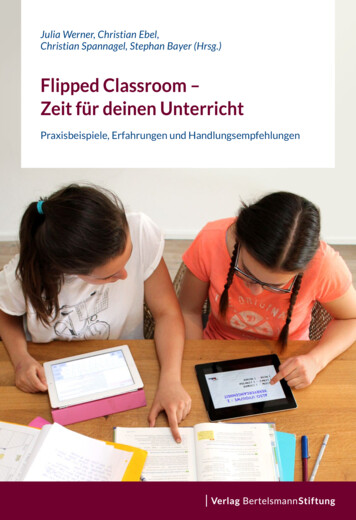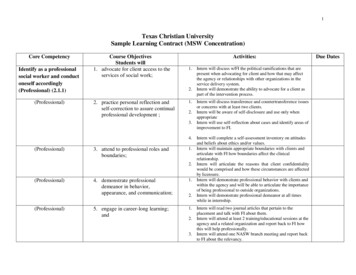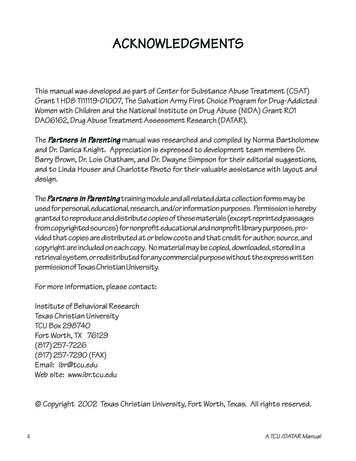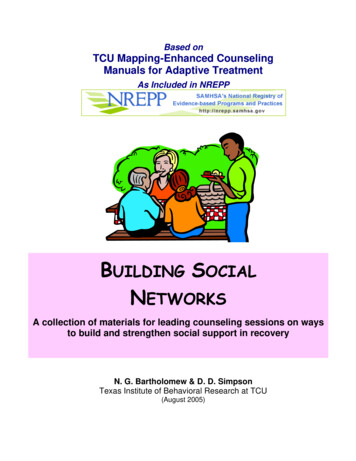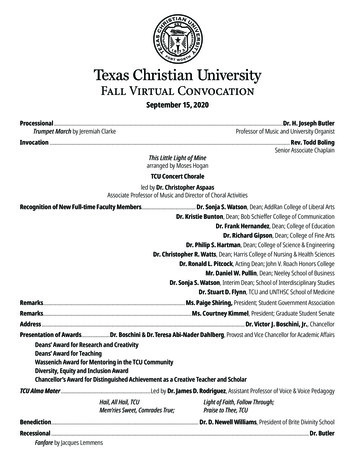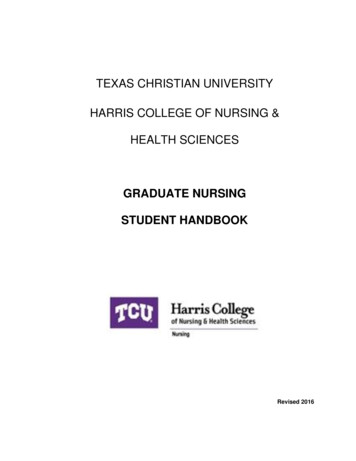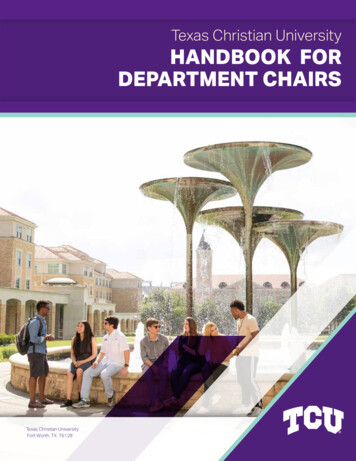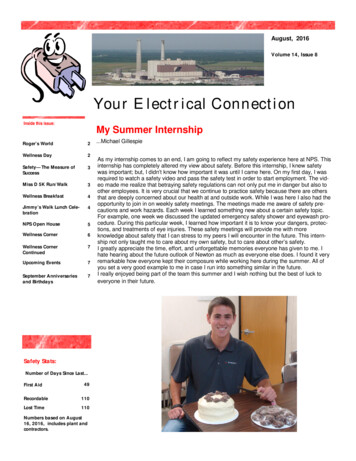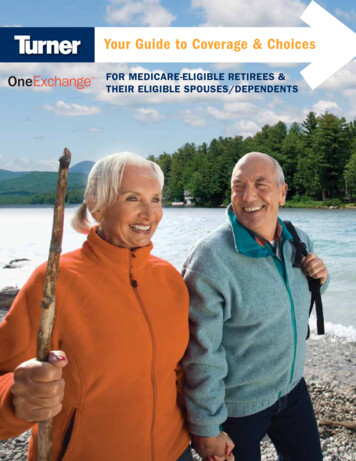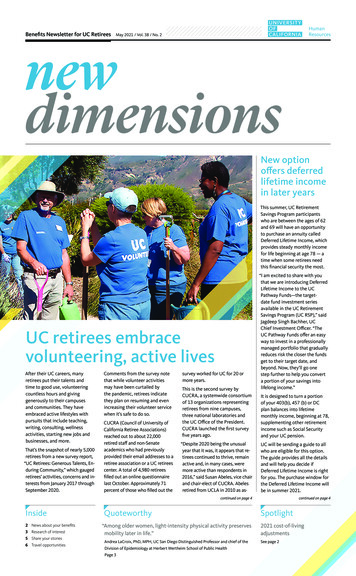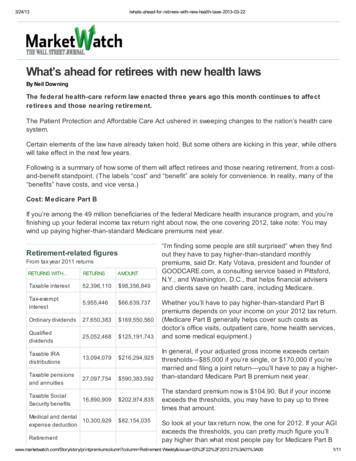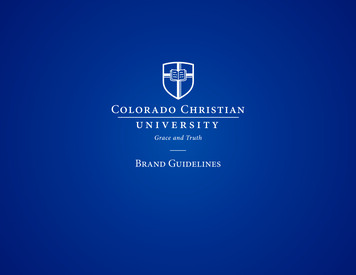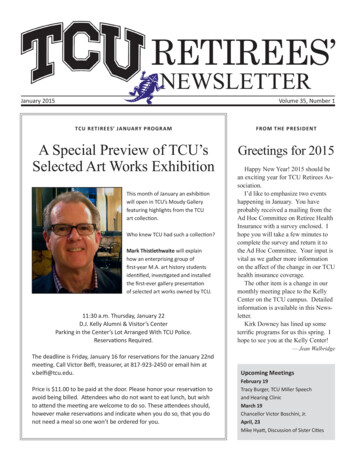
Transcription
RETIREES’NEWSLETTERJanuary 2015Volume 35, Number 1TCU RETIREES’ JANUARY PROGRAMFROM THE PRESIDENTA Special Preview of TCU’sSelected Art Works ExhibitionGreetings for 2015This month of January an exhibitionwill open in TCU’s Moudy Galleryfeaturing highlights from the TCUart collection.Who knew TCU had such a collection?Mark Thistlethwaite will explainhow an enterprising group offirst-year M.A. art history studentsidentified, investigated and installedthe first-ever gallery presentationof selected art works owned by TCU.11:30 a.m. Thursday, January 22D.J. Kelly Alumni & Visitor’s CenterParking in the Center’s Lot Arranged With TCU Police.Reservations Required.Happy New Year! 2015 should bean exciting year for TCU Retirees Association.I’d like to emphasize two eventshappening in January. You haveprobably received a mailing from theAd Hoc Committee on Retiree HealthInsurance with a survey enclosed. Ihope you will take a few minutes tocomplete the survey and return it tothe Ad Hoc Committee. Your input isvital as we gather more informationon the affect of the change in our TCUhealth insurance coverage.The other item is a change in ourmonthly meeting place to the KellyCenter on the TCU campus. Detailedinformation is available in this Newsletter.Kirk Downey has lined up someterrific programs for us this spring. Ihope to see you at the Kelly Center! — Jean WalbridgeThe deadline is Friday, January 16 for reservations for the January 22ndmeeting. Call Victor Belfi, treasurer, at 817-923-2450 or email him atv.belfi@tcu.edu.Price is 11.00 to be paid at the door. Please honor your reservation toavoid being billed. Attendees who do not want to eat lunch, but wishto attend the meeting are welcome to do so. These attendees should,however make reservations and indicate when you do so, that you donot need a meal so one won’t be ordered for you.Upcoming MeetingsFebruary 19Tracy Burger, TCU Miller Speechand Hearing ClinicMarch 19Chancellor Victor Boschini, Jr.April, 23Mike Hyatt, Discussion of Sister Cities
2January 2015TCU Retirees’ NewsletterJosé Feghali1961 - Dec. 9, 2014The Brazilian-born 1985 CliburnGold Medal Piano Winner and TCUfaculty member, José Feghali wasfound in his apartment dead from agunshot wound to the head, accordingto news reports.After his award, which he won afteralmost withdrawing due to a pulledmuscle and an allergenic reaction tomedication for it, he began a careerin which he played with most of themajor orchestras in the USA includingthe Kennedy Center and Carnegie Hallas well as with the London Symphony,the Berlin Philharmonic, Royal Philharmonic, and Warsaw Philharmonic.He was also very technically adept andengineered more than 50 audio recordings.In 1990 Feghali became a TCU artist-in-residence, professor of piano andwas the School of Music’s coordinatorof Internet technologies. He remainedactive as a Cliburn board memberand Feb. 27, 2014 participated in theMemorial Anniversary Concert for VanCliburn held in Sundance Square.Angela Fabry, Feghali’s agent andfriend, told KERA Radio News that hewas a multi-talented man. Fabry saysFeghali was so proficient with computers and audio recording, he correctedthe code in Microsoft’s music software.Fabry is director of Performing ArtsInternational.At TCU, Ferghali received theMichael F. Ferrari Award for Distinguished Service and Leadership for hiswork with Internet2, video conferencing and streaming technology.Director of TCU’s School of Musicwas quoted in a letter to the TCUFamily from Provost Nowell Donovan as saying, “We are shocked andprofoundly saddened at the passing ofour beloved and respected friend andIN MEMORIAMcolleague, José Feghali. His passionfor music and for teaching was infectious, as was his curiosity and thirst forknowledge about virtually all subjects.José was a brilliant pianist with abrilliant mind. His influence at TCU,in Fort Worth, and indeed the worldof music, was and will remain trulysignificant.”The musician began his performingcareer when he was 5 years old and atage 8, he appeared with the BrazilianSymphony Orchestra.He was 24 when he won the goldmedal and the chamber music prize atthe 1985 Cliburn. His mother lives inBrazil.Marcus David BryantJuly 18, 1924-Dec. 6, 2014Marcus Bryant, a fifth-generationmember of the Disciples of ChristChurch, came to TCU’s Brite DivinitySchool in 1967 where he remained until retirement as emeritus professor ofpastoral care and psychology in 1991.Born in Gilbert, Ark., Bryant graduated from high school in Garnett, Kan.and was at Kansas State Universitywhen he was inducted into the Army,one of four brothers serving in WorldWar II. He was a radio operator from1943 to 1946 then went to college onthe G.I. Bill and earned his bachelor’sdegree in 1949 from Lynchburg College in Virginia. His masters’ waseared at Columbia College and UnionTheological Seminary in New York.After earning his Master of Divinity in1953 at Lexington Theological Seminary in Kentucky, he got his doctoratein educational psychology from theUniversity of Nebraska.An ordained minister, Bryant servedchurches in Virginia, New York,Kentucky, Nebraska and Illinois beforeteaching in seminaries, starting withthe Divinity School at Drake.As a licensed psychologist inTexas, Bryant helped to open the BritePastoral Care and Training Center tooffer training to seminary students andcounseling to the public. Bryant was adiplomate in the American Associationof Pastoral Counselors and publishedtwo books and many articles aboutpastoral care.Ruth “Toni” Kilbey NewtonFeb. 5, 1917 – Nov. 22, 2014A bright smile was always thegreeting inside the Chancellor’s Officewhen Toni Newton was working fortwo of the Chancellors,J. M. Moudy and William E. Tucker.Dr. Tucker delivered the homily at hermemorial service Dec. 2 at UniversityChristian Church.The key to her 20-year service in theChancellor’s office came from UCCSenior Minister Rev. Larry Thomas.He had asked her once about herexperience with the two TCU leaders,and all she would say was that theywere two different men with differentleadership styles. Her confidentialityand her calm composure captured notonly their trust, but also that of all tocame calling.Her natural talent as a musician ledher mother to start piano lessons forContinue IN MEMORIAM on P3
January 2015IN MEMORIAM from P2her when she was four years old. Inhigh school, she played for tap dancing classes at a studio near the school,and she was an accompanist for choirs,band and orchestra soloists in competitions.After graduation from high school inMaywood, Ill. at age 16, she attendedthe Walton School of Commerce Business College, then enrolled in MillikinUniversity in Decatur, Ill. where shemajored in business administration. AtMillikin she joined Delta Delta Deltaand in 2013 earned a diamond pin for75 years membership in the sorority.She also participated in universitysports, continuing her interest fromhigh school where she was pitcher forthe softball team. At Millikin, she wascaptain of the University’s soccer teamand participated in other sports open towomen.Wherever Newton was, she excelled: high school music and sports;business college awards for speed andaccuracy for shorthand and typing;university singing in a trio, writingharmony, and sports.While husband Bill was in theMarines, she lived with her mother inBuffalo, N.Y. and worked for CurtissWright during World War II. Afterthe war, the family lived in Abilene,Texas where she was active with youthgroups in church and the schools theirsons attended, served as Cub Scoutleader for three years and was the officer in charge of flowers for the AbileneGarden Club.3TCU Retirees’ NewsletterThe family moved to Fort Worth in1962, and thus began her career withTCU. She joined the Sweet Adelineswhere she sang bass as well as singing in a women’s quartet. Also shebelonged to several bridge and gardenclubs. In an informal comment afterthe service, Dr. Tucker remarked thatToni Newton never ask for recognition.Paulette Gail BurnsJune 10, 1949-Dec. 12, 2014TCU’s former Harris College Deanof Nursing Paulette Burns’ life wasclaimed early by pancreatic cancer.Provost Nowell Donovan said, “Herpassing leaves a void for all of us, avoid that is both personal and professional.”Early in his career as Provost, Donovan had to decide whether to choosethe single candidate chosen by thesearch committee when Rhonda Keenstepped out of her role as head of theSchool of Nursing, the largest unit inthe College or start another search.Internal candidate Burns was hischoice. The Beaver, Oklahoman attended TCU on a full scholarship fromthe Army followed by further trainingat the University of Maryland’s WalterReed. She received her BSN fromMaryland, a MSN from the Universityof Oklahoma and a doctorate fromTexas Women’s University.In 2001 when Burns returned toTCU as director of the Harris Schoolof Nursing, she brought a nursingeducation and administration careerthat included director of OU’s directorof graduate nursing program at Tulsa.In 2006, Burns received that appointment as the second dean of the newHarris College of Nursing and HealthSciences. In 2005 Burns was named aRobert Wood Johnson Executive NurseFellow.Provost Donovan said in his letter tothe TCU family, “Paulette fought withpassion to develop excellence in all theDepartments entrusted to her care.(T)he splendid new building is basically hers and in my mind at least willalways be “Paulette’s Palace.”The letter also noted that she supported the development of initiatives,including the Master of Social Workprogram, two centers of excellence:the Center for Oncology Education anResearch and the TCU Center for Evidence-Based Practice and Research:A Collaborating Center of the JoannaBriggs Institute,And an oncology-emphasis nursingtrack. Also, she was instrumental instarting TCU’s accelerated baccalaureate nursing track, the first of its kind inTexas.Acting Dean Susan Weeks was alsoquoted in his letter as saying, “Dr.Burns was a visionary leader, a valuedcolleague and a treasured friend.”INOTE: If you learn of the passing of a facultyor staff member, please send the information,with obituary, when possible, to:d.newsom@tcu.edu.READ ’EM AND WEEP, OR LAUGH, OR YAWNBook Lovers ReminderThe Coffee, Books and Conversation group meets again on Wednesday, January 14, 2015, at 10 a.m.in the libraryat University Christian Church. We will be discussing the book, “Coming Home,” by Rosamunde Pilcher. If you havequestions please call Judy Smith at 817-921-47098.
4January 2015TCU Retirees’ NewsletterScreening of Older AdultsThe holidays are fast approaching and the splendor and joy of theholidays before us. I hope you had acomfortable and satisfying fall seasonto lay the foundation for a great holiday season!The New Year offers each of us achance to reflect on our current healthand lay plans for promoting our healthin 2015. This month’s column will focus on the concept of screening duringolder years. Screening for illness andhealth status assumed greater importance with the health care system’smove toward more preventive healthand provisions of the Affordable CareAct (“ObamaCare”). Consumer healthcare screening identifies illness inits early stages to slow its progression. Early detection saves money forconsumers, health care plans, and thelarger health care system. Screeningmay also involve teaching consumersabout ways to prevent disease or slowits development in those at risk forcertain diseases. Risk factors often include family history of a disease (highblood pressure, diabetes, etc.), obesity,poor nutrition, lack of exercise, history of smoking, high stress, increasedage, or lack of a social network toprevent depression and other illnesses.One common screening testinvolves a fasting (person has notrecently eaten) blood sugar as part ofan annual physical exam. Screeningsomeone for high blood sugar values(blood glucose) if they have a familyhistory of that disease makes sense toidentify at regular intervals a consumer’s potential to develop diabeticdisease. Improvement in diet, exercisepatterns, and stress management mayprevent the disease or “stall” its development for persons at risk for diabetesHEALTH HELP NOWby Carolyn Caglebased a variety of factors.Health care plans vary in covering(providing benefits or services) forvarious screening tests. Increasinglythose plans include benefits coveredunder Medicare Part B for retirees.For example, “traditional” (MedicareA and B) Medicare covers the costof breast cancer screening (mammograms) every year for women ages40 years and older; a consumer paysnothing if their doctor or health careprovider accepts assignment (provideragrees to accept Medicare paymentamount for that service withoutcharging one money to cover a higherprovider fee). Coverage of an annualscreening mammogram for an olderwoman saves money as compared tothe costs of surgery, chemotherapy,and other cancer services for thatwoman. Insurance coverage for anannual mammogram for a woman atrisk for breast cancer developmentmay prevent later more complicated(late-stage) breast cancer that imposesfinancial, social, and emotional strainon a woman. Medicare normallycovers a screening mammogram (nohistory of identified problems) forwomen without any out-of-pocket costat the current time.I encourage you to examine TheMedicare & You Book (Centers forMedicare & Medicaid Services, CMS,2014) that offers specific informationabout health care benefits for screening tests and exams focused on prevention or management of early-stageillness. This book often contains specific information for where you live:my MO booklet contains informationon Medicare plans that operate hereto inform me and my husband aboutplans and benefits we can later talkabout with OneExchange. Similarbooks for Medicare Advantage Plans(those delivered by UnitedHealthcare, Humana, Coventry etc.) containequivalent information. Close readingof those books offers valuable information for those of you who wish toprevent or manage an existing diseasewith a doctor’s help.“Traditional” Medicare and Medicare Advantage plans provide benefitsfor the following screening exams forcommon health issues: abdominal aortic aneurysm: ananeurysm is a “ballooning” (“pouching out”) of the aorta, the primaryblood vessel in your abdomen; persons at risk for developing this includemen ages 65 years and older, thosewith a family history of aortic aneurysm, and smokers of 100 cigarettesor more during their lifetime; thoseat risk may need a referral from theirdoctor to get free screening as part oftheir “Welcome to Medicare Physical”(available to anyone within 12 monthsof having Medicare B); otherwiseMedicare covers a one-time assessment for an aortic aneurysm for thoseat risk alcohol misuse and counseling:Medicare covers one screening peryear for those at risk (people who usealcohol but are not dependent on it);Continue HEALTH HELP NOW on P5
January 2015colonoscopy [internal examination ofa greater percentage of bowel than theMedicare also covers four face-tosigmoidoscopy] every 10 years; riskface counseling sessions per year forfactors and findings from the latteridentified alcohol abuserstwo exams may require more frequent bone mass density (BMD):testingwomen (and men) with low bone den depression: Medicare covers ansity (weak “porous” bones that mayannual assessment of a person’s copsupport an osteoporosis diagnosis) areing conducted in a primary care docat risk for breakage or fracture; Meditor’s office; this assessment seems imcare covers BMD screening normallyportant due to 25% of persons havingvery 24 months for those at riska chronic illness (an incurable disease cardiovascular disease: Medithat must be managed) experiencingcare provides benefits fordepression thatblood tests every 5 yearsaffects theirthat may show conditionsScreening may alsoquality of lifeleading to stroke or heart diabetes:attack; these blood testsinvolve teachingMedicaremeasure one’s lipids (fats),beneficiariescholesterol, and triglycerconsumers about ways (those receivides; persons at high risk ofing benefitscardiovascular disease may to prevent disease orfrom Medihave these tests coveredcare) receivemore frequently; all olderslow its developmentblood glucosepersons should have theirscreening evblood pressure assessed an- in those at risk forery 24 monthsnually and more often withbut more oftenrisk for high blood prescertain diseases.with activesure or existence of actualdiabetes or ifdiseasethey are at risk for that disease vaginal/cervical/breast cancer: EKG (heart function): coverageMedicare covers testing every 24for this test occurs once during themonths for these diseases; women at“Welcome to Medicare Physical” andrisk or with history of an abnormalmore often in those at risk for heart orPap (cervical smear) within the past 3high blood pressure diseaseyears may receive annual testing glaucoma: Medicare covers an prostate cancer: Medicarenual screening for those at risk (thoseprovides an annual benefit of PSAages 65 years or more, diabetics, Afri(prostate screening antigen) screeningcan Americans) for elevated pressureand finger rectal exam for men agesin the eyes50 years and older hearing and balance: Medicare colo-rectal cancer: Medicarecovers an assessment of one’s hearprovides benefits covering variousing and balance by a doctor or hearscreening exams for this disease; theseing specialist, particularly if an oldermay involve an annual fecal [stool]person has experienced difficulty inoccult [hidden] blood test; flexiblehearing or falling; it is helpful to notesigmoidoscopy [internal examinationthat most Medicare health insuranceof the lower bowel] every 4 years orpolicies do NOT cover hearing aidHEALTH HELP NOW from P45TCU Retirees’ Newslettercosts; the Miller Speech and HearingClinic recently announced discountedservices for hearing screening andaids for TCU personnel that may helpdecrease costs associated with hearingloss devices falls: Medicare may also payfor assessment of an older person’srisk for falls; these include a person’shistory of falling, ability to engage indaily activities, hearing impairment,appropriate height and weight balance, and appropriate BP (low bloodpressure may cause a person to “passout” and fall); the biggest concernwith a fall is that the person will breaka hip or other bone and that may require long-term care and expense!Once you have had Medicare for atleast one year, you pay nothing for anannual “wellness” visit. This visit willhelp you develop, with the help ofyour doctor or provider, an individualized plan to help you stay healthy.Overall, this visit should emphasizeno smoking, healthy food, fall prevention, exercise, stress management, anddevelopment of social networks tosupport your needs and wishes duringyour older years.I’ll be back in 2015 with someinformation on older adult immunizations, an aspect of illness preventionand health promotion. Until then, mybest wishes for a safe and satisfyingholiday season!Reference:Centers for Medicare & Medicaid Services(CMS) (2015).Medicare & You(CMS Product No. 10050-16).Baltimore, MD: U. S. Department of Healthand Human Services.(available at 1-800-MEDICARE[1-800-633-4227])
6January 2015TCU Retirees’ NewsletterPLACES TO GO. PEOPLE TO SEE. THINGS TO DO.HEALTH OPPORTUNITIES ON CAMPUSSun., Jan. 25 Two readings inTCU’s Department of Theatrein its Kaleidoscope Series: Riders to the Sea and Spreadingthe News at 2:30 and 7:30p.m. Hays Theatre.TCU’s Wellness Gold program is memberbased for all university faculty, staff,retirees, and their spouses/partners. Foursix-week classes will be conducted in thespring, each starting on a Monday andending on a Friday. Each class is limited to20 participants. You need to enroll early toparticipate.AcademicsDec. 26 - Jan. 10Intersession first and lastdays of class.Jan. 9 Spring session Registration.Jan. 12 First day of classes.Jan. 19 Martin Luther King,Jr. HolidayEntertainmentand InformationWed., Jan. 21 Fogelson Hon
Jan 08, 2018 · tended TCU on a full scholarship from the Army followed by further training at the University of Maryland’s Walter Reed. She received her BSN from Maryland, a MSN from the University of Oklahoma and a doctorate from Texas Women’s University. In 2001 when Burns returned to TCU as direct
